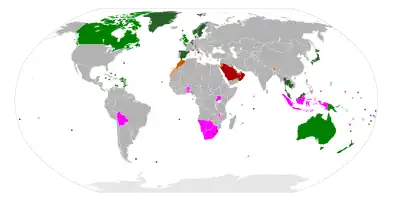Constitutional monarchy
A constitutional monarchy is a form of monarchy. In a constitutional monarchy, a king or queen is the official head of state. However, their powers are limited by a constitution and they usually do not have much real power, as the legislative branch is the primary governing body. A constitutional monarchy is different than an absolute monarchy because in absolute monarchies, the monarch is able to rule with full power, and is able to change the laws freely.

Creation
Constitutional monarchy first emerged in England. At first, the British monarchy was absolute. However, the nobility under King John felt that the king had abused his power, and forced him to sign a document called Magna Carta.[1] This document limited the powers of the king and made him somewhat responsible for the wellbeing of his subjects. The document, however was more focused on maintaining the ability of the nobles to have a say in what the king did.
Contemporary constitutional monarchies include the United Kingdom and Commonwealth realms, Belgium, Bhutan, Bahrain, Cambodia, Denmark, Japan, Jordan, Kuwait, Liechtenstein, Lesotho, Luxembourg, Malaysia, Monaco, Morocco, the Netherlands, Norway, Spain, Eswatini, Sweden, and Thailand.
List of current reigning monarchies
The following is a list of reigning monarchies. Except where noted, monarch selection is hereditary as directed by the state's constitution.
| State | Last constitution established | Type of monarchy | Monarch selection |
|---|---|---|---|
| 1981 | Kingdom | Hereditary succession. | |
| 1993 | Co-Principality | Selection of Bishop of La Seu d'Urgell and election of French President | |
| 1901 | Constitutional Monarchy and Parliamentary Democracy. | Hereditary succession. | |
| 1973 | Kingdom | Hereditary succession. | |
| 1966 | Kingdom | Hereditary succession. | |
| 2002 | Kingdom | Hereditary succession | |
| 1831 | Kingdom; popular monarchy[2] | Hereditary succession | |
| 1929 | Elective absolute monarchy | The Pope is elected by the cardinals of the Catholic Church | |
| 1981 | Kingdom | Hereditary succession. | |
| 2007 | Kingdom | Hereditary succession. | |
| 1993 | Elective monarchy; Kingdom | Chosen by throne council | |
| 1867 (last updated 1982) | Constitutional Monarchy and Federal Parliamentary Democracy. | Hereditary succession. | |
| 1953 | Kingdom | Hereditary succession | |
| 2009 | Parliamentary Democracy and Constitutional Monarchy. | Hereditary succession. | |
| 1974 | Kingdom | Hereditary succession. | |
| 1962 | Kingdom | Hereditary succession. | |
| 1946 | Empire | Hereditary succession | |
| 1952 | Kingdom | ||
| 1971 | Kingdom; mixture of Constitutional and Absolute monarchy | ||
| 1962 | Emirate | Hereditary succession, with directed approval of the House of Al-Sabah and majority of National Assembly | |
| 1993 | Kingdom | Hereditary succession directed approval of College of Chiefs | |
| 1862 | Principality | ||
| 1868 | Grand duchy | ||
| 1957 | Elective monarchy; Federal monarchy | Selected from nine hereditary Sultans of the Malay states | |
| 1911 | Kingdom | ||
| 1666 | Kingdom | ||
| 1815 | Kingdom | ||
| 1814 | Kingdom | ||
| 1907 | Constitutional Monarchy and Parliamentary Democracy. | Hereditary succession. | |
| 1975 | Kingdom | Hereditary succession. | |
| 1983 | Kingdom | Hereditary succession. | |
| 1979 | Kingdom | Hereditary succession. | |
| 1979 | Kingdom | Hereditary succession. | |
| 1978 | Kingdom | Hereditary succession. | |
| 1978 | Kingdom | ||
| 1968 | Kingdom; Mixture of absolute and constitutional monarchy | Hereditary succession | |
| 1974 | Kingdom | Switched from semi-constitutional monarchy to constitutional monarchy | |
| 2007 | Kingdom | ||
| 1970 | Kingdom | ||
| 1978 | Kingdom | Hereditary succession. | |
| 1971 | Federal Union of Emirates Elective monarchy |
President elected by the seven absolute monarchs of the Federal Supreme Council | |
| 1688 | Constitutional Monarchy and Parliamentary Democracy. | Hereditary succession. | |
References
- "English translation of Magna Carta". The British Library. Archived from the original on 2023-01-17. Retrieved 2018-05-24.
- Belgium is the only existing popular monarchy — a system in which the monarch's title is linked to the people rather than a state. The title of Belgian kings is not King of Belgium, but instead King of the Belgians. Another unique feature of the Belgian system is that the new monarch does not automatically assume the throne at the death or abdication of his predecessor; he only becomes monarch upon taking a constitutional oath.